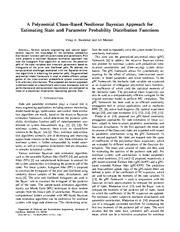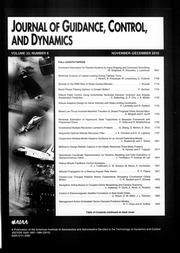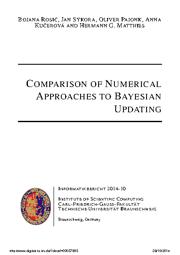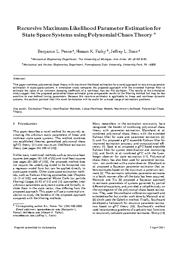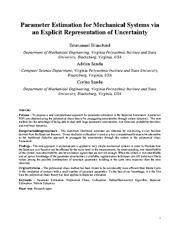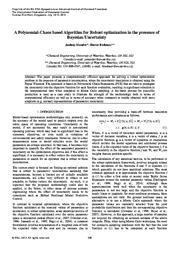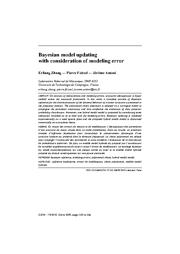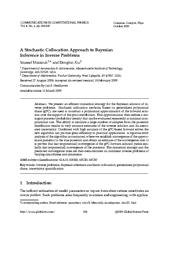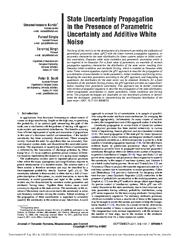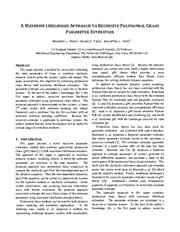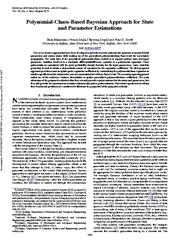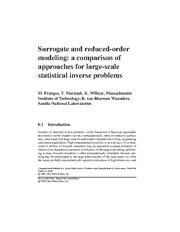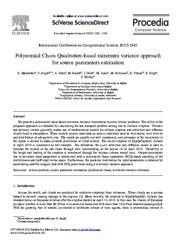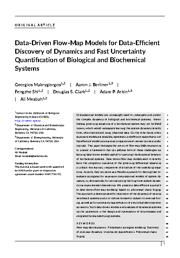A copy of this work was available on the public web and has been preserved in the Wayback Machine. The capture dates from 2016; you can also visit the original URL.
The file type is application/pdf.
Filters
A polynomial chaos-based nonlinear Bayesian approach for estimating state and parameter probability distribution functions
2016
2016 American Control Conference (ACC)
This work presents a nonlinear Bayesian estimation approach that uses the histogram filter algorithm to construct the posterior pdfs of the state variables and uncertain parameters based on histograms ...
Various systems engineering and control applications require the knowledge of the complete probability distribution function (pdf) of system states and parameters. ...
State estimation algorithms are mostly based on the recursive Bayesian estimation framework, which determines the posterior probability distribution function (pdf) of states/parameters conditioned on system ...
doi:10.1109/acc.2016.7525220
dblp:conf/amcc/Bavdekar016
fatcat:meb7ads5arfztbgqfemelsmhme
Nonlinear Estimation of Hypersonic State Trajectories in Bayesian Framework with Polynomial Chaos
2010
Journal of Guidance Control and Dynamics
., Sandhu, A., “A Polynomial Chaos Based Bayesian Approach for Estimating Uncertain Parameters of Mechanical Systems Part 1: Theoretical Approach,” Computer Science Dept., Virginia Polytechnic Inst. and ...
D., Sandhu, A., “A Polynomial Chaos Based Bayesian Approach for Estimating Uncertain Parameters of Mechanical Systems Part 1: Theoretical Approach,” Computer Science Dept., Virginia Polytechnic Inst. and ...
doi:10.2514/1.49743
fatcat:3lcynpycmrbdtjc5r7vqfedvju
Comparison of Numerical Approaches to Bayesian Updating
[chapter]
2016
Computational Methods in Applied Sciences
, as well as the functional approximation approaches in the form of the polynomial chaos based linear Bayesian filter and its corresponding square root algorithm. ...
There are two approaches being adopted in this research: one that uses the classical formula for measures and probability densities and one that leaves the underlying measure unchanged and updates the ...
Acknowledgement This outcome has been achieved with the financial support of the German Research Foundation (DFG), Czech Science Foundation, project No. 105/12/1146 and the German Academic Exchange Service ...
doi:10.1007/978-3-319-27996-1_16
fatcat:fa4yer57yjegzbtrkwo7h2nlau
Recursive maximum likelihood parameter estimation for state space systems using polynomial chaos theory
2011
Automatica
This paper combines polynomial chaos theory with maximum likelihood estimation for a novel approach to recursive parameter estimation in state-space systems. ...
Because this recursive estimator is applicable to linear and nonlinear dynamic systems, the authors portend that this novel formulation will be useful for a broad range of estimation problems. ...
Army TARDEC through its center for excellence in automotive modeling and simulation. ...
doi:10.1016/j.automatica.2011.08.014
fatcat:xuc26v5cefd33fsvnitzwgint4
Parameter estimation for mechanical systems via an explicit representation of uncertainty
2009
Engineering computations
Purpose -To propose a new computational approach for parameter estimation in the Bayesian framework. ...
Design/methodology/approach -The maximum likelihood estimates are obtained by minimizing a cost function derived from the Bayesian theorem. ...
A rigorous framework for parameter estimation is the Bayesian approach, where probability densities functions are being considered representations of uncertainty. ...
doi:10.1108/02644400910970185
fatcat:i3nx2vqy2zgfzpnk24nymsgjoq
A Polynomial-Chaos based Algorithm for Robust optimization in the presence of Bayesian Uncertainty
2012
IFAC Proceedings Volumes
The approach is based on Polynomial Chaos Expansions (PCE) that are used to propagate the uncertainty into the objective function for each function evaluation, resulting in significant reduction in the ...
The paper presents a computationally efficient approach for solving a robust optimization problem in the presence of parametric uncertainties, where the uncertainty description is obtained using the Bayes ...
In a Bayesian approach, the posterior distribution of the parameters is proportional to a likelihood which is a function of measurements and a prior probability which represents any available information ...
doi:10.3182/20120710-4-sg-2026.00041
fatcat:7beqhffi7be3hitw73dng7ilgy
Bayesian model updating with consideration of modeling error
2010
European Journal of Computational Mechanics
The polynomial chaos expansion is adopted as a surrogate model to propagate the parameter uncertainty and thus accelerate the evaluation of their posterior probability distribution. ...
In this work, a complete process of Bayesian inference for the characterization of the dynamic behavior of a linear structure is presented in the frequency domain. ...
The Gausse-Hermite quadrature was used to estimate the coefficients of the polynomial chaos expansion based on the non-intrusive approach, the validity of the polynomial chaos expansion is verified in ...
doi:10.13052/ejcm.19.255-266
fatcat:ymrqagl4grdb3nkmkqgxqejrmm
A Stochastic Collocation Approach to Bayesian Inference in Inverse Problems
2009
Communications in Computational Physics
Stochastic collocation methods, based on generalized polynomial chaos (gPC), are used to construct a polynomial approximation of the forward solution over the support of the prior distribution. ...
We present an efficient numerical strategy for the Bayesian solution of inverse problems. ...
Generalized polynomial chaos The generalized polynomial chaos (gPC) is an orthogonal polynomial approximation to random functions. ...
doi:10.4208/cicp.2009.v6.p826
fatcat:77g2x4ufbzcj5fqc65n2srimga
State uncertainty propagation in the presence of parametric uncertainty and additive white noise
2010
Proceedings of the 2010 American Control Conference
Sampling the uncertain parameters according to the gPC approach, and integrating via quadrature, the distribution for the state vector can be obtained. ...
For a fixed value of parameters, an ensemble of moment propagation equations characterize the distribution of the state vector resulting from Gaussian initial conditions and stochastic forcing, which is ...
Conclusion Two new efficient hybrid Bayesian approaches based on polynomial chaos are proposed in this work for the accurate determination of uncertainty propagation in linear dynamic models with parametric ...
doi:10.1109/acc.2010.5531048
fatcat:2xppwoq4lbatphdn6gjntikcxu
A maximum likelihood approach to recursive polynomial chaos parameter estimation
2010
Proceedings of the 2010 American Control Conference
This paper presents a method for recursively estimating the static parameters of linear or nonlinear stochastic dynamic systems given the systems' inputs and outputs. ...
The paper accomplishes this objective by combining polynomial chaos theory with maximum likelihood estimation. The parameter estimates are calculated in a recursive or iterative manner. ...
Army TARDEC through its center for excellence in automotive modeling and simulation. The authors would like to acknowledge this financial support. ...
doi:10.1109/acc.2010.5531345
fatcat:xclunps23rhpfldoo2j6qvts2y
Polynomial-Chaos-Based Bayesian Approach for State and Parameter Estimations
2013
Journal of Guidance Control and Dynamics
Two new recursive approaches have been developed to provide accurate estimates for posterior moments of both parameters and system states while making use of the generalized polynomial-chaos framework ...
These polynomials are associated with the prior probability density function for the input parameters. ...
Acknowledgment This material is based upon work supported by the National Science Foundation under award number CMMI-1054759 and Air Force Office of Scientific Research (AFOSR) grant number FA9550-11-1 ...
doi:10.2514/1.58377
fatcat:uml3kctqmndj7nqpxqqk3jesua
Surrogate and Reduced-Order Modeling: A Comparison of Approaches for Large-Scale Statistical Inverse Problems
[chapter]
2010
Large-Scale Inverse Problems and Quantification of Uncertainty
For illustration, we consider a Bayesian formulation of the inverse problem. ...
Section 0.2 presents an overview of state-of-the-art approaches. ...
The nonlinear discretized residual vector f : R N × R p × [0, ∞) → R N is for generality written as a function of the state, parameter inputs, and time. ...
doi:10.1002/9780470685853.ch7
fatcat:oloehpfm7zesfg6lcdzw3zprga
Parameter identification in a probabilistic setting
2013
Engineering structures
It also seems to be the fastest and more reliable when compared with other methods. We show by example that it also works for highly nonlinear non-smooth problems with non-Gaussian measures. ...
The unknown quantity is modelled as a (may be high-dimensional) random variable. Such a description has two constituents, the measurable function and the measure. ...
[32] combine polynomial chaos theory with maximum likelihood estimation, where the parameter estimates are calculated in a recursive or iterative manner. ...
doi:10.1016/j.engstruct.2012.12.029
fatcat:iydq3vup6jfv5jnd6fghw7wg5u
Polynomial Chaos Quadrature-based Minimum Variance Approach for Source Parameters Estimation
2012
Procedia Computer Science
We present a polynomial chaos based minimum variance formulation to solve inverse problems. ...
Output uncertainty due to uncertain input parameters is determined with a polynomial chaos quadrature (PCQ)-based sampling of the multidimensional puff input vector space. ...
Recently, the polynomial chaos (PC) based estimation algorithms have garnered attention for parameter estimation problem. ...
doi:10.1016/j.procs.2012.04.122
fatcat:b5t4z6oxh5aeheeybgmiokkalu
Data-Driven Flow-Map Models for Data-Efficient Discovery of Dynamics and Fast Uncertainty Quantification of Biological and Biochemical Systems
[article]
2022
bioRxiv
pre-print
We present a data-efficient approach to data-driven flow-map modeling based on polynomial chaos Kriging. ...
The approach is demonstrated for discovery of the dynamics of various benchmark systems and a co-culture bioreactor subject to external forcing, as well as for uncertainty quantification of a microbial ...
We present a data-efficient approach to data-driven flow-map modeling based on polynomial chaos Kriging. ...
doi:10.1101/2022.02.19.481146
fatcat:fwnf3gg4mbehngubsmozrvi2sy
« Previous
Showing results 1 — 15 out of 1,724 results

